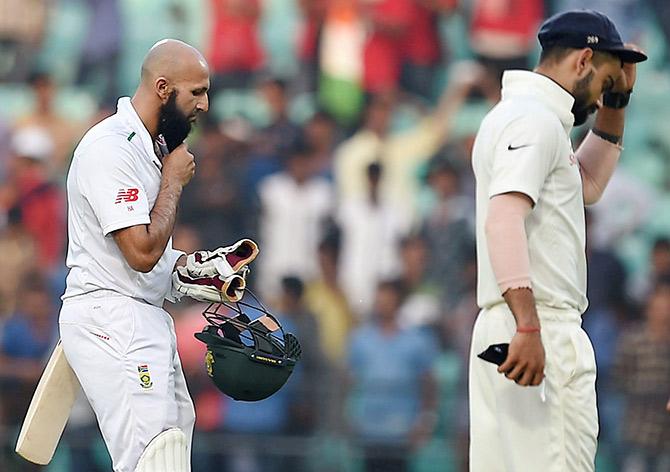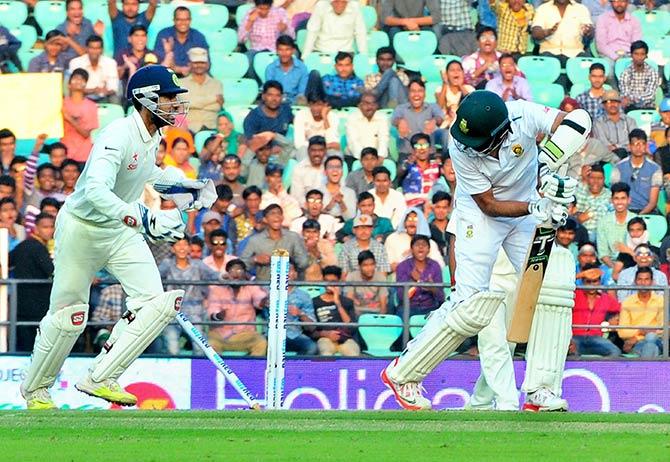Going by the state of the pitch and match situation after Day 1 in the ongoing third Test against South Africa in Nagpur, few are betting against another three-day finish, says Harish Kotian/Rediff.com.

India's last four home Test matches finished within three days. They include the first match of the ongoing series against South Africa in Mohali.
The Tests in the two-match series against the West Indies in November 2013 and the fourth and final Test against Australia in Delhi in March 2013 also ended in three days.
Going by the state of the pitch and the match situation after Day 1 in the ongoing third Test against South Africa in Nagpur, few are betting against another three-day finish.
India were bowled out for 215 in their first innings after electing to bat first before claiming a couple of quick wickets to reduce South Africa to 11 for two at stumps on Day 1, on a pitch offering a lot of turn and bounce to the spinners.
- Images from third Test, Day 1
While no one is complaining against India preparing spinning tracks to capitalise on home advantage, not many are happy to see five-day Tests ending inside three days.
The 'ordered-to-make' pitches start turning square from the first session of the match, resulting in the conditions loaded too much in favour of the bowlers.
Sanjay Bangar, India's assistant coach, sought to defend the wicket at the Vidarbha Cricket Association stadium in Nagpur, saying the conditions are same for both teams.
"It is definitely a result wicket and it's a wicket which is equally challenging for both sides. Whichever side adapts to it has a chance of winning the game," he said, after the first day's play in Nagpur on Wednesday.
His reasoning, though, is not totally justified since he talks about India encountering seaming wickets from ball one when playing abroad.
It is common knowledge that any fresh wicket will assist the seam bowlers, at least in the first hour. It has been observed that except for the odd venue or two, the wickets for Tests in places like Australia and England generally get better for batting with every passing day of a match.
“When India travels overseas the ball starts seaming from Day 1; I think right from the first over. As I said earlier, the wickets are the same for both sides. I think it is a test of skill, just as you have the skill to counter against the seaming ball, the skill against the spinning ball is also equally important,” Bangar reasoned.
South Africa off-spinner Simon Harmer, who claimed four for 78 in the first innings in Nagpur, said the aim of the wicket is not about lasting five days but to get a result.
"I don't think the wickets are prepared to last five full days. The reason behind the preparation of the wickets is to get a result. When the Indian team comes to South Africa we are going to prepare wickets that suit our bowlers. So them playing one seamer it's clear to see what sort of wicket they are preparing," he said.

The consequence of India's obsession with turning tracks is that it is also affecting their top batsmen.
Opener Murali Vijay, who has got runs in every innings in this series, is an exception and that can also be partly attributed to the fact he bats early on against the seamers, thereby getting his eye in before the spinners come into the picture.
Ajinkya Rahane and Virat Kohli failed in all three innings of the series so far, while Shikhar Dhawan has also struggled to get his bearings right.
Bangar believes that batsmen are at a slight disadvantage when batting on such tough wickets, but "it is part of the game".
"What happens when the wicket is slightly challenging there are likely to be certain errors in judgement, but I think it is part of the game," he said.
Instead of dwelling on the pitches, he believes that the teams need to accept that the series is a low-scoring one and devise ways to do better than the opponent.
"It is a very challenging wicket to score and so far you see the six completed innings in the series. This has been a low-scoring series and you need to accept that."
Even captain Virat Kohli was not too amused discussing the wicket in the lead-up to this Test match.
"I don't know why there is so much cry about the wickets in India. We absolutely have no problems playing on this sort of a wicket. If both teams don't agree on playing on a particular wicket, then it is a wicket that is not suited for a game of cricket. But we are absolutely ready, all 11 of us. No problems," he had said.
Bangar had some advice for the batsmen on tackling spinners on this wicket.
"Patience is a very, very important virtue here, as well as playing the spinning ball, making sure you are trusting your defences all the time; in defence, trying to get to the pitch of the ball as much as you can, else use the depth of the crease or use your feet.
"I think some of our batsmen who got off to starts... they exhibited it in enough instances and that was the reason they could last that longer. All of our batsmen actually played a lot of balls during their innings."
With attendance dwindling in stadiums for Test matches, one wonders if three-day Tests is a step in the right direction to preserve the longest format of the game.






